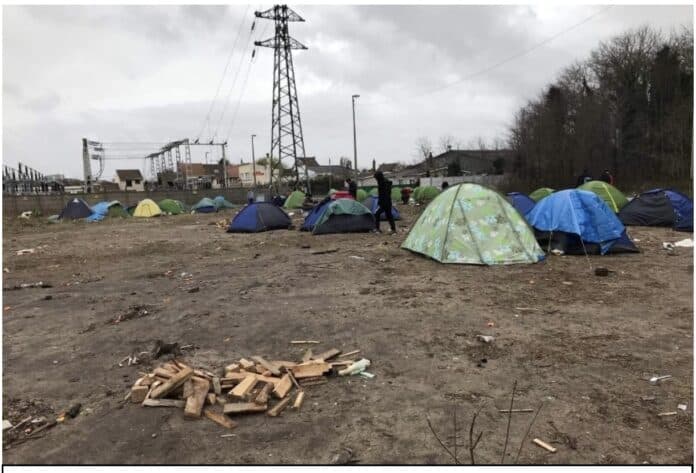Covid has been one of the most destructive things to impact modern society in recent history. In order to combat against it, many governments, on the advice of the World Health Organisation, have enforced social distancing and PPE to be worn as the ‘new normal’ for citizens. While this has been very challenging for many from a mental health perspective, to physically distance from one another is a request most people in Europe have had the luxury of being able to obey.
However, the situation for migrants in Northern France is quite different.
Late 2016 saw the destruction of Calais refugee camp, nicknamed ‘The Jungle’, and the subsequent eviction of some 4,000 migrants living there. Since then there has been an ongoing game of cat and mouse between those hoping to seek asylum in the United Kingdom and the Compagnies Républicaines de Sécurité (CRS: French riot control and security police force). A temporary camp will be erected by refugees, the capacity will become too large, and the CRS will come in and destroy it.
The most recent example of this coming on 29th September. Where a temporary camp made up of around 700 migrants was dismantled by the CRS in the Northern Port of Calais.
Most migrants currently living in Northern France dream of becoming asylum seekers in the United Kingdom. However, the UK immigration policy is set to change as the country leaves the European Union from 1 January 2021, thus making it increasingly harder for migrants to enter the country legally. The government policy will run on a points-based system which will “give top priority to those with the highest skills and the greatest talents.”
However, it also indicates their will be no route into the country for immigrants seeking low-skilled jobs. In the summer of 2020 Prince Charles encouraged students and out of work people living in Britain to work as seasonal fruit pickers due to shortages in the labour market. A job vacancy typically occupied by low-skilled migrants. With this being the case, it seems an unusual decision for the UK Government to no longer allow migrants into the country when there is such a shortage of labour in sectors such as agriculture; which the economy still relies on.
Having fled from conflict, poverty or persecution in their countries of origin, this policy, along with other immigration policy currently in place, has forced many migrants to attempt to get to the UK through illegal means. They have risked the perilous journey, often on foot, having been sold a lie by human traffickers; being promised a perfect life in the UK, if they can pay the price. As a result, many will tolerate the inhumane living conditions endured in the region, in order to have a chance at living out this dream.
This does force the question; how much can really be endured?
Indeed, many temporary camps have no running water, no toilets, no food, among a distinct lack of other necessities of life. All living there rely heavily on the work of local charities such as Care4Calais and Refugee Community Kitchen. However, with the spread of Covid-19 the work these organisations can do has become even more limited. Furthermore, physical distancing is impossible in these camps, so, should it be impacted by the virus, Covid-19 would easily rip through the community.
The EU have enforced that migrants must seek asylum in the first country they enter upon leaving their home country. For most people travelling from the Middle East and Africa, they would be expected to seek asylum in Italy or Greece. However, for those aiming for countries such as Germany France and the UK, they will not declare their arrival into Europe until reaching their target destination. As a result, those living in Calais become ineligible for medical treatment in local French hospitals, should they contract the virus. Thus, the mortality rate is expected to be significantly higher amongst refugees.
Calais has a long history of being opposed to immigration, with the current Mayor, Natacha Bouchart, being very outspoken against immigration of any form into France. The region she governs has been hit extremely hard economically for years due to the presence of migrants illegally living there. This has resulted in the locals creating a very hostile environment towards these refugees. Therefore, Tuesday’s action to destroy another temporary camp comes as no surprise.
Migrants still living in Calais seem faced with an impossible decision. The local authorities will not give them any support. With Brexit on the horizon, it will only become harder for them to enter the UK. Plus, with the addition of the dangers that the spread of Covid present to them, living conditions seem very dire.
Tom Foot
PLEASE SUPPORT US FOR JUST £2 A MONTH







